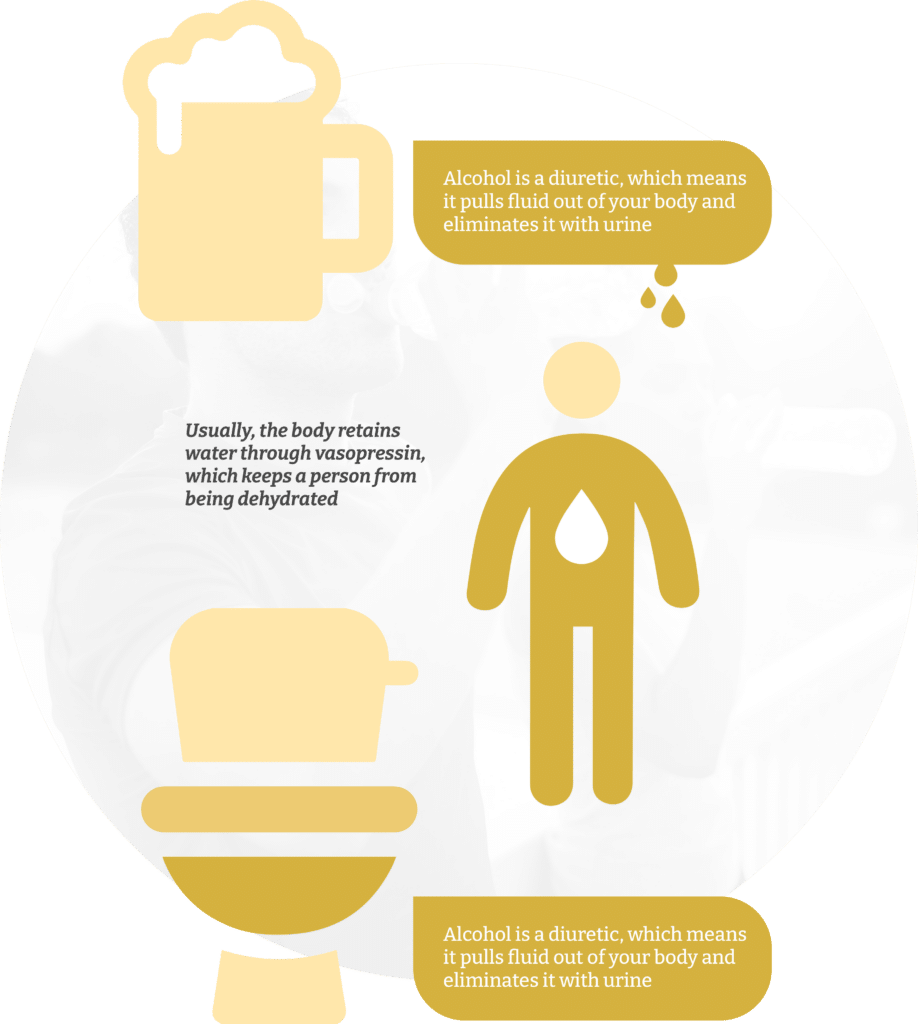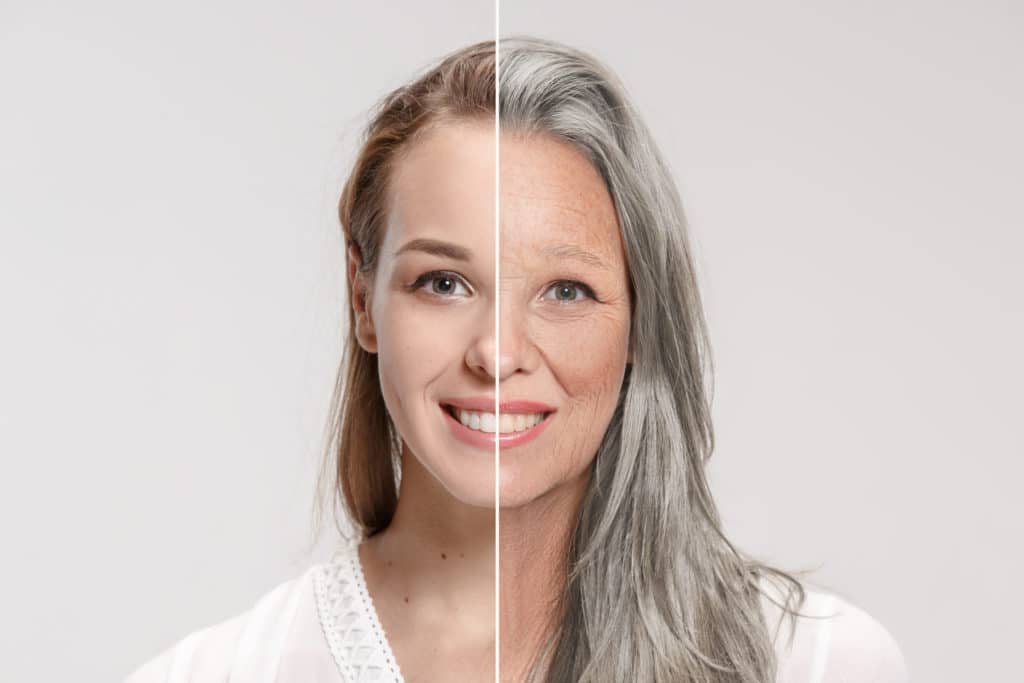Drinking alcohol may make you feel younger as you lose your inhibitions and gain some energy, but the hangover the next day can make you feel sick, sluggish, and downright old. Even if you don’t experience acute after-effects, alcohol can age you. You may not realize it, but alcohol and aging effects go hand-in-hand.
Does the effects of alcohol on the skin and aging cause wrinkles? The damaging effects of alcohol on skin and aging wreak havoc on your health and could make you look and feel older than you are.
At Lifetime Recovery in Mullica Hill, New Jersey, we can help you or a loved one suffering from alcohol abuse recover with our winning treatment solutions, and become free from the cycle of addiction.
Alcohol And Its Effects On Aging
You may know that alcohol dehydrates you. The substance is a diuretic, which means that it pulls fluid out of your body and eliminates it via urine.
Normally, the body creates a hormone called vasopressin, which helps your body retain water, limiting the amount of fluid that you excrete through the renal system. This helps prevent you from becoming dehydrated when you’re not drinking.
Alcohol reduces the amount of vasopressin that your body makes. That’s why you often have to urinate more frequently when you’re drinking.
Older adults have less water in their bodies than younger people. Because you need water for almost every bodily function, including blood circulation and lubricating joints, you may feel the effects of aging more intensely if you drink regularly.
Does Drinking Alcohol Cause Wrinkles?
Dehydration can sap your skin of moisture and elasticity, leading to sagginess, dryness, and wrinkles. In other words, alcohol use can make you look old. Moreover, the older you get, the more likely you are to be dehydrated. Even one night of heavy drinking can make your lines and wrinkles look more pronounced.
Alcohol Ages Your Eyes
Almost every adult deals with arcus senilis by the time they’re 80. While this condition is generally harmless, it is a visible sign of aging. Research shows that people who drink heavily have a 33 percent greater chance of getting arcus senilis, a telltale gray ring around their corneas before they turn 60.
Alcohol Affects Your Blood Vessels
Wrinkles aren’t the only skin condition that can age you. Broken capillaries, the tiny blood vessels near the surface of the skin, tend to crop up as you get older. Drinking alcohol dilates your capillaries. If you drink too much, the blood vessels can burst, causing red spots and spidery splotches. Older drinkers are maybe even more likely to experience this. Their blood vessels are less elastic than young people’s. Therefore, drinking alcohol can compound the natural effects of aging.
Alcohol Affects Your Body’s Restorative Abilities
Consuming alcohol can make you look and feel old immediately. It also influences your body’s ability to heal itself, which can affect the way that you age in the future.
Alcohol Disrupts Sleep
Many people don’t realize that alcohol can alter your sleep patterns. Although drinking too much can make you fall asleep more easily, it also reduces the amount of time that you spend in the rapid eye movement, or REM, stage. REM sleep is considered restorative. If you’re missing out on it, you could exacerbate health issues or just feel extra drowsy and mentally foggy throughout the day.
Depriving yourself of adequate sleep can make you age faster. Sleep loss deteriorates your cells. If you’re aging faster than you would otherwise, you’re also increasing your risk of age-related health problems.
Alcohol Causes Oxidative Stress
Researchers have found that oxidative stress damages DNA in a way that can lead to premature aging. While oxidative stress is a natural part of your body’s functioning, it can become imbalanced if you consume substances that generate more free radicals than your body can handle.
Oxidative stress damages the cells throughout your body. It can deteriorate your skin, muscles, organs, and brain. As you age, the body’s mechanisms that protect you from free radicals diminish. Therefore, you’re at a greater risk of developing a wide range of health problems, including the neurodegenerative conditions that affect your cognition and memory.
Alcohol Impairs Healthy Habits

Cells contain telomeres, which are strands of DNA on your chromosomes. Telomeres protect your chromosomes from damage and are longer in younger people. Shorter telomeres are associated with diseases such as diabetes and cancer.
Lack of exercise can shorten your telomeres. One study demonstrated that people who were sedentary for more than 10 hours per day and exercised for less than 40 minutes had cells that were biologically eight years older than people who moved around more.
Because alcohol makes you more likely to do things that you might not otherwise do, consuming it can interfere with an otherwise healthy diet. Would you eat that entire box of donuts if you were sober? Plus, the calories in alcohol mainly come from sugar.
Alcohol has few beneficial nutrients and could cause you to pack on the pounds. Moreover, excessive sugar intake is linked to inflammation, which is associated with a wide range of health conditions that can worsen with age.
Alcohol Makes You Feel Older Than You Are
Does alcohol cause wrinkles in young people? If you’re blessed with genetics that resists wrinkles and other visible signs of aging, you might not notice the way that alcohol affects your appearance. But you may feel older due to alcohol and aging effects.
Alcohol damages brain cells. Some types of dementia and alcohol-related brain damage develop as your brain cells shrink. Over time, heavy drinking can lead to loss of judgment, focus, and memory. You may have more trouble regulating your emotions or managing your coordination.
Older people often have concerns about falling, which is a common cause of injury in seniors. But younger people who drink alcohol are at a higher risk of injury from falls due to dizziness and confusion. Chronic alcohol use weakens bones and makes them more likely to break in a fall. It also increases your likelihood of developing osteoporosis.
Final Thoughts About Alcohol and Aging Effects
Even if you’re not a heavy drinker, the toll that alcohol can take ages you. One night of heavy drinking can make your wrinkles more evident. While that consequence is temporary, if it continues, it could have lasting effects.
Regular drinkers can trigger biological functions that make them age from the inside out. If you drink heavily or consistently, you could activate the aging process, putting you at risk of health conditions that typically affect older people.
If you or a loved one struggles to regulate or limit alcohol consumption, you don’t have to do it alone. Give your body the best chance at health and reclaim your youthful energy.
Our programs are flexible and customized to target your specific needs. We work with individuals, couples, and families to ensure that you and your loved ones are on the same page when it comes to your sobriety. Contact us to find out how we can help you navigate the path to recovery and optimize your physical and mental health.


